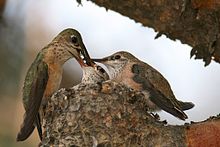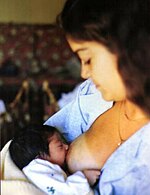
Back استثمار أبوي Arabic Péče o potomstvo Czech Elternaufwand German Patra investado Esperanto Inversión parental Spanish سرمایهگذاری والدین Persian Parentaalinen investointi Finnish Investissement parental French Investimento parental Galician Investasi orang tua ID


Parental investment, in evolutionary biology and evolutionary psychology, is any parental expenditure (e.g. time, energy, resources) that benefits offspring.[1][2] Parental investment may be performed by both males and females (biparental care), females alone (exclusive maternal care) or males alone (exclusive paternal care). Care can be provided at any stage of the offspring's life, from pre-natal (e.g. egg guarding and incubation in birds, and placental nourishment in mammals) to post-natal (e.g. food provisioning and protection of offspring).
Parental investment theory, a term coined by Robert Trivers in 1972, predicts that the sex that invests more in its offspring will be more selective when choosing a mate, and the less-investing sex will have intra-sexual competition for access to mates. This theory has been influential in explaining sex differences in sexual selection and mate preferences, throughout the animal kingdom and in humans.[2]
- ^ Clutton-Brock, T.H. 1991. The Evolution of Parental Care. Princeton, NJ: Princeton U. Press. pg. 9
- ^ a b Trivers, R.L. (1972). Parental investment and sexual selection. In B. Campbell (Ed.), Sexual selection and the descent of man, 1871-1971 (pp. 136–179). Chicago, IL: Aldine. ISBN 0-435-62157-2.